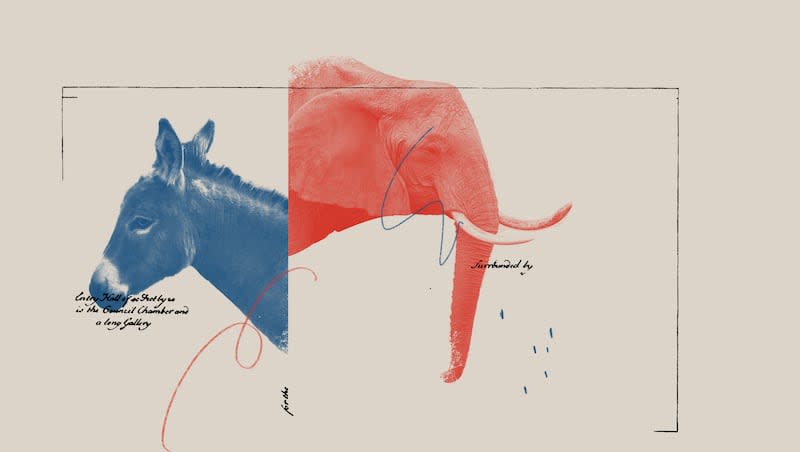What is the ‘uniparty’? Here’s what Sen. Mike Lee says

- Oops!Something went wrong.Please try again later.
- Oops!Something went wrong.Please try again later.
After weeks of threats, Rep. Marjorie Taylor Greene’s attempt to oust House Speaker Mike Johnson, R-La., failed earlier this week. The majority of representatives sided against her, choosing to reject her efforts in order to prevent the House from falling into what several called “chaos.” As Greene spoke on the floor about her call for a vote on the motion to vacate the chair, many lawmakers booed her. The Georgia Republican pushed back: “This is the uniparty, for the American people watching.”
This term “uniparty” originally surfaced in a 1944 editorial in a Pennsylvania newspaper in reaction to fabricated news that Franklin D. Roosevelt’s Republican rival in the 1940 election was handpicked by his adviser Harry Hopkins, according to Politico Magazine. In the modern day, it’s used by some members in the Republican Conference to imply Democrats and Republicans are working together and against the interests of the American people.
Sen. Mike Lee told the Deseret News he uses the word most frequently in the context of spending bills, including the most recent $95 billion foreign aid supplemental package for Ukraine, Israel and Taiwan.
Typically, these bills, largely unvetted by the public and lawmakers, are introduced on the House floor, and “this almost mysterious force, steps in and unifies enough members of both houses and local political parties to support them,” he said.
More recently, Lee said he saw another instance of this “uniformity,” when Congress took on the reauthorization of Section 702 of the Foreign Intelligence Surveillance Act. After encouraging calls from Democratic and Republican congressional leaders, lawmakers passed it without an amendment requiring intelligence agencies to get a warrant to spy on Americans after calls from Democratic and Republican congressional leaders to do so.
“I heard someone say that sometimes the battle really isn’t about left versus right, about liberal versus conservative, about Democrats versus Republicans. Sometimes the battle was about Washington, D.C., versus everyone else,” he said.
Lee clarified that bipartisanship is still important and he routinely works with Democrats. “Just a couple of weeks ago, I was in a meeting with Pramila Jayapal on the House side, and she’s a member of the squad,” he said. “It would be a mild understatement to say that she and I don’t always agree on everything.”
The Utah senator said he and Jayapal, a Washington Democrat, managed to find common ground: FISA reform. But, he said, there’s a difference between “bipartisanship and uniformity.”
“Very often the uniformity is marked by a collusive agreement between the elected leaders of the two political parties in the two chambers,” Lee said.
He said Utah voters often ask him why their elected officials are voting in favor of a bill they previously opposed. These questions inspired his efforts to teach the masses about the “uniparty” phenomena in creative ways.
On May 2, Lee said he was attaching the symbol of the unicorn to the uniparty. “While other options exist, none get the job done like this one,” he wrote on X, formerly known as Twitter. “It’s a symbol. It’s a nickname. It’s the Uniparty Unicorn.”
In a separate post, he came up with a Haiku, a Japanese poem with seventeen syllables. “Unicorns are nuts. They steal the souls of many. Sapping our freedom,” Lee wrote.
Another Haiku from May 1, said, “Printing money fast. Uniparty’s grip tightens. Americans pay.”
He said he has always been intrigued by the Haiku style and likes using “different ways of getting the point across.”
But, as Lee says, not every effort to reach across the aisle is evidence of a grand collusion. In many cases, it can represent different areas of agreement, and the different points of view held by members of the same party.
When the Deseret News and KSL editorial boards in late April asked Republican Rep. John Curtis, who represents Utah’s 3rd District, his thoughts on the idea of a “uniparty,” he called it “hypocrisy” to criticize bipartisanship, especially when a handful of GOP lawmakers relied on House Democrats to strip former Speaker Kevin McCarthy, R-Calif., of his gavel last year.
Matthew Burbank, a political science professor at the University of Utah, said given the maneuvering Johnson had to go through to pass several foreign aid bills, the use of the word could feel justified if American politics wasn’t as highly polarized as it is now.
“If you go back to the ‘80s, the ‘70s or the ‘60s, the American party distinctions were just not nearly as sharp and clear ... as they are today,” he said. U.S. voters also think there are greater differences between the two parties, as evident through polling, said Burbank, adding he doesn’t think the word describes the reality of politics. As far as he can tell, it’s “designed to be a pejorative term” against so-called “Washington insiders.”

